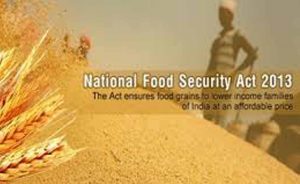
The National Food Security Act, 2013 (also Right to Food Act) is an Act of the Parliament of India which aims to provide subsidized food grains to approximately two thirds of India’s 1.2 billion people.WHO Defines Food security to exists when all people, at all times, have physical, social and economic access to sufficient, safe and nutritious food which meets their dietary needs and food preferences for an active and healthy life.
Food security has three interlinked contents such as :-
Availability of food,
Access to food and
absorption of food.
Food security is a multidimensional concept covering even the micro level household food security,energy intakes and indicators of malnutrition.
Major components of food security are:-
Production and Procurement
Storage
Distribution
National Food Security Mission
National Food Security Mission comprising rice, wheat and pulses to increase the production of rice by 10 million tons, wheat by 8 million tons and pulses by 2 million tons by the end of the Eleventh Plan (2011-12). The Mission is being continued during 12th Five Year Plan with new targets of additional production of food grains of 25 million tons of food grains comprising of 10 million tons rice, 8 million tons of wheat, 4 million tons of pulses and 3 million tons of coarse cereals by the end of 12th Five Year Plan.
The National Food Security Mission (NFSM) during the 12th Five Year Plan will have five components
(i) NFSM- Rice;
(ii) NFSM-Wheat;
(iii) NFSM-Pulses,
(iv) NFSM-Coarse cereals and
(v) NFSM-Commercial Crops.
National Food Security Act
Under National Food Security Act every person belonging to identified eligible households is entitled to receive 5 Kg of foodgrains per person per month at subsidized prices under TPDS. The existing Antyodaya Anna Yojana (AAY) households, which constitute the poorest of the poor, will continue to receive 35 Kg of foodgrains per household per month. Foodgrains under TPDS under the Act will be made available at subsidized prices of Rs. 3/- and Rs. 2/- per Kg for rice and wheat respectively under priority category.
Under NFSA, state governments are required to identify households to be covered under AAY and priority categories within a year from the commencement of NFSA and place the list of identified eligible households in the public domain
Under NFSA, computerization of TPDS operations has been taken up with the aim to improve the efficiency of the current system and to address various challenges such as leakages and diversion of foodgrains, fake and bogus ration cards, lack of transparency and weak grievance redressal mechanisms.
UKPCS Notes brings Prelims and Mains programs for UKPCS Prelims and UKPCS Mains Exam preparation. Various Programs initiated by UKPCS Notes are as follows:-- UKPCS Mains Tests and Notes Program
- UKPCS Prelims Exam 2024- Test Series and Notes Program
- UKPCS Prelims and Mains Tests Series and Notes Program
- UKPCS Detailed Complete Prelims Notes
